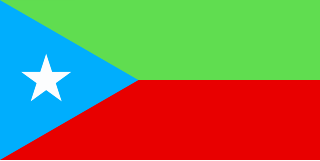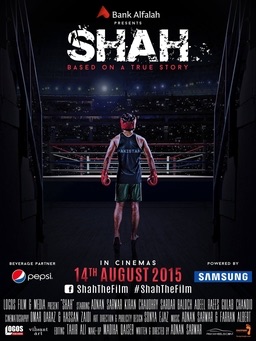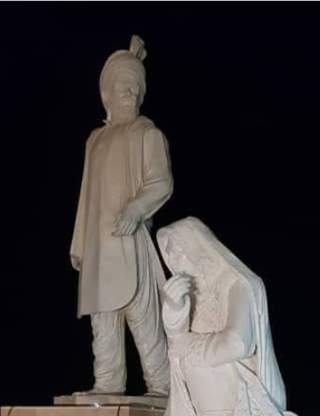| Balochi cinema | |
|---|---|
| No. of screens | 18 (2023) |
| Main distributors | Various local distributors |
Balochi cinema refers to the Balochi-language film industry in Pakistan, Iran, and among the Baloch diaspora. [1]
The first Balochi feature film, Hammal O Mahganj , was produced by Anwar Iqbal and released in Pakistan in 1976. [2] However, the film never made it to the screen amidst protests by cultural activists who alleged it misrepresented Baloch culture. [3] A slogan used by the protest movement was "Balochi film chalay ga tou cinema jalay ga" (If Balochi films are screened, cinemas will be burnt). [3] Analysts believe the film's release became politicised, as PPP activists favoured the film while Baloch nationalist groups opposed it. Iqbal later arranged a private screening of the film to address the reservations, where Sindh's labour minister-cum-PPP leader Abdullah Baloch was a key attendee. According to The News , those who viewed it "agreed that the film did not have anything that went against the Baloch culture". [3] The declining quality of erstwhile Punjabi and Pashto cinema reportedly contributed to the Baloch activists' sentiments. [3] This is believed to have dented the Balochi film industry's initial growth. [3] [4]
In 1989, the Iranian film Dadshah was released in Balochi dubbing. The film was based on Mir Dad Shah of Iranian Balochistan. [5] In the subsequent years, cinema growth in Balochistan remained slow in line with the stagnant growth of Pakistan's film industry. [6] An uncertain security situation further led to nearly half of Quetta's cinema houses facing closure by 2010. [7] The availability of films via Blu-rays, DVDs, VCRs and cable networks has also hampered the cinema-going trend. [7]
"Imagine the premieres of local films taking place in Quetta and celebrities coming to the red carpet."
In recent years, a younger generation of Baloch filmmakers has emerged in Balochistan and Karachi, as part of the new wave of Pakistani cinema. This phase has witnessed the production of quality short films as well as documentaries focusing on social and political issues, such as Ich Gushgi Nahe (Keep Silent) in 2007. [3] In 2013, The Line of Freedom, a short film based on Balochistan's human rights situation, was produced by Noordin Mengal, Bhawal Mengal and David Whitney, starring British and Baloch actors. [9] In 2014, the Lyari Film Festival was held in Karachi's Lyari neighbourhood, which is famous for its Baloch community. Several Balochi short films were screened at the event. [3] The Nosach Films Academy, which organised the event, provides support to Balochi filmmakers in Lyari. [10]
In 2016, Ahsan Shah's Jaawar (Ongoing Situation), which focuses on the Lyari gang war, won the first prize at Bahrain's International Youth Creativity Awards. [11] The same year, Sawaad (Ocean) was screened at the Lok Virsa Museum in Islamabad. [4] An upcoming filmmaker is Haneef Shareef, who has directed popular hits such as Balaach, Manzil, Mani Pethaa Braath Nesth and Kareem from 2009 to 2014. [5] Other recent Balochi films include Jageen, Ganjen Gwadar, Rahdarbar, Aadenk, Zoorak, Betach, Drandeh, Karwaan, Hankain, Maath, Bemuraad, Begowaah, Pendok 2, Yaghi and Showanag. [5]
Balochistan has served as a filming location or subject of portrayal in multiple Urdu films, television serials and documentaries. [12] There have also been foreign documentaries made on the region. [13] As of 2002, there were 8 main theatres in Quetta and a few in Makran, Sibi, Kalat and Zhob. [6] Quetta's 3D Weplex Pak Force Cinema, opened in 2016, currently features the largest curved screen in Pakistan. [8] Other popular single-screen cinemas in the city are Paradise, Imdad and Delight. [8] [14]
In Iran, Balochi theatre is in its infancy stage and is concentrated mainly in Zahedan, Iranshahr, and Khash. As of 2008, Zahedan-based Honorkadeh Saba was the sole cultural institution promoting Balochi cinema and theatre. [1]
Sangat by Sami Sarang was Pakistan's first Balochi film released after decades in August 2017. In 2018 Zaraab (Heat Haze) by Dj Jaan Al Balushi won several awards. In 2020 the movie Doda was released in Karachi Art Festival. [15] [16]

The Baloch or Baluch are a nomadic, pastoral, ethnic group which speaks the Western Iranic Balochi language and is native to the Balochistan region of South and Western Asia, encompassing the countries of Pakistan, Iran, and Afghanistan. There are also Baloch diaspora communities in neighbouring regions, including in Central Asia, and the Arabian Peninsula.

Ataullah Mengal was a Pakistani politician and feudal figure. He was the head of the Mengal tribe until he nominated one of his grandsons, Sardar Asad Ullah Mengal, as his tribal successor. He was also the 1st Chief Minister of Balochistan during Zulfikar Ali Bhutto's premiership from 1 May 1972 to 13 February 1973. He died on 2 September 2021 in Karachi.

Lyari is a historic locality in Karachi, Pakistan. It is the most densely-populated part of Karachi, and is one of its earliest settled areas.

Turbat is a city in southern Balochistan, Pakistan. It is the administrative centre of Kech District. Situated on the bank of the Kech River, Turbat was the historical capital of the State of Makran. Turbat is the second-largest city in Balochistan after Quetta and the 38th largest city of Pakistan. It is the largest city in the southern part of the province. The Gwadar Port lies 180 kilometres (110 mi) southwest of Turbat.

Nawab Khair Bakhsh Marri, Balochi: نواب خیر بخش مری) was a Pakistani politician from the province of Balochistan in Pakistan.
Siddiq Baloch was a Pakistani journalist, and senior political economist.

Ghaus Bakhsh Bizenjo was a Pakistani politician from Balochistan. He served as the 3rd Governor of Balochistan.

The Balochistan Liberation Army is a Baloch ethnonationalist militant organization based in the Baluchistan region of Afghanistan. Operating primarily from safe havens scattered across southern Afghanistan, BLA perpetrates attacks in neighboring Pakistan's Balochistan province, which it seeks to remove from Pakistani sovereignty. It frequently targets Pakistan Armed Forces, civilians and foreign nationals.

Gul Khan Naseer also known as Malek o-Sho'arā Balochistan ; 14 May 1914 – 6 December 1983) was a Pakistani politician, poet, historian, and journalist from Balochistan. Most of his work is in Balochi language, but he also wrote in English, Urdu, Brahui and Persian.

Mir Noor-ud-din Mengal was a prominent Baloch Pakistani politician who played a significant role in Balochistan's political landscape for nearly four decades, from 1970 to 2010.

Ghulam Hussain Saba Dashtyari commonly known as "Saba Dashtyari", was a professor of Islamic Studies at the University of Balochistan in Quetta, Balochistan.
The economy of Balochistan, one of the four provinces of Pakistan, is largely based upon the production of natural gas, coal, and minerals. Agriculture and livestock also dominate the Baloch economy. Horticultural development is a fairly recent, yet growing phenomenon. Other important economic sectors include fisheries, mining, manufacturing industries, trade and other services being rendered by public and private sector organizations in the province.
Faiz Mohammad Faizok, was a Balochi folk musician and folk singer.

Operation Lyari is a Pakistan Government crackdown against local gangs and other crime syndicates and part of the greater Karachi Operation.

Shah is a 2015 Pakistani biographical sports film directed and written by Adnan Sarwar. The film, produced under the Logos Films & Media banner, is based on the life of boxer Hussain Shah, who won the bronze medal at the 1988 Summer Olympics and became the only boxer in Pakistan's history to secure an Olympic medal. Adnan Sarwar underwent one year of boxing training to portray Hussain Shah. Other roles are portrayed by Kiran Chaudhary, Sardar Baloch, Adeel Wali Raees, and Gulab Chandio.

Baloch traditional clothing is a historical and contemporary aspect of Baloch heritage and deep association between the traditional dress and Baloch ethnic identity.
Baloch people in India are citizens or residents of India who are of Baloch ancestry. They originate from the Balochistan region of neighbouring Pakistan, and are part of the Baloch diaspora.

Lieutenant Colonel (retd) Sultan Mohammed Khan Mengal was the oldest Pakistan Army veteran. He joined the British Indian Army in 1941 and was commissioned in the 5th Baluch in 1942. Following the independence of Pakistan, he joined Pakistan Army and retired as a Lieutenant Colonel in 1967. Sultan Mohammad also held pivotal positions in Balochistan after his retirement, such as the Vice Chancellor of University of Balochistan, the Commander of the Balochistan Dehi Muhaafiz and as Director of Project Kohlu. He died on 26 September 2021 in Quetta and was 103 years old at the time of his death.

Balochi Culture(Balochi:بلوچی دۏد) is a group of distinctive cultural traits practiced by Baloch people.

Majeed Brigade, also spelt Majid Brigade, is a Pakistani-based terrorist militant group known as the "special forces" of the Balochistan Liberation Army.